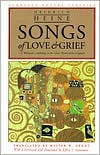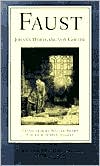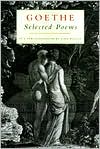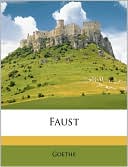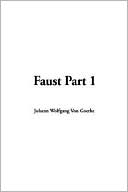Songs of Love and Grief: A Bilingual Anthology in the Verse Forms of the Originals
Heinrich Heine (1797-1856) is undoubtedly Germany's most significant poet of the nineteenth century, second in importance only to Goethe. Heine's poetry appeared in all major European languages and was immensely popular throughout the nineteenth century, but has been neglected by modern readers. Now the eminent translator Walter W. Arndt has rectified this situation by producing sparkling new translations of Heine's love poems. Although many of Heine's poems are deceptively simple on the...
Search in google:
Heinrich Heine (1797-1856) is undoubtedly Germany's most significant poet of the nineteenth century, second in importance only to Goethe. Heine's poetry appeared in all major European languages and was immensely popular throughout the nineteenth century, but has been neglected by modern readers. Now the eminent translator Walter W. Arndt has rectified this situation by producing sparkling new translations of Heine's love poems. Although many of Heine's poems are deceptively simple on the surface, the multiple allusions, word plays, and shifts and breaks in diction and tone make them almost untranslatable. Arndt not only renders the meaning of the originals, but preserves the poems' rhyme schemes as well as their moods and multiple cultural resonances. Arndt captures both the simplicity of the Germanic folk song structure and the Romantic pathos and imagery that Heine both evokes and undermines, revealing the identification with and alienation from German culture expressed so poignantly in Heine's poetry. This bilingual edition includes an illuminating introduction by Heine scholar Jeffrey L. Sammons.Publishers WeeklyHeine's reputation as one of Germany's greatest 19th-century poets has been overpowered by the fact that most people know his poems through song: to date, according to Jeffrey L. Sammons's introduction, over 8000 have been set to music. There are multiple ironies in having these lieder represent German folk culture: Heine (1797-1856) was born Jewish and subsequently baptized; a politically active lawyer in pre-unification Germany, he spent the last 25 years of his life exiled in Paris, where he produced work suffused with both longing and revulsion for his native land. This collection, which spans Heine's poetic career, presents the German originals and Arndt's translations on facing pages. Arndt, an emeritus professor of the humanities at Dartmouth, is unable to prevent Heine's peculiar brand of ironically charged Romanticism from sliding into sing-song English. He does, however, recognize and bring to the fore much of Heine's coded anguish: ``I seem to hear a far-off droning,/ Nightwatchmen's horn-sounds, dear and soft,/ Nightwatchmen their refrains intoning,/ And sobs of nightingales aloft.'' (Nov.)
\ Songs of Love & Grief\ \ A BILINGUAL ANTHOLOGY TRANSLATED IN THE VERSE FORMS OF THE ORIGINALS \ \ \ \ By WALTER W. ARNDT \ NORTHWESTERN UNIVERSITY PRESS \ Copyright © 1995 \ \ Northwestern University Press\ All right reserved.\ \ \ ISBN: 978-0-8101-1324-4 \ \ \ \ \ Chapter One Youthful Sufferings Junge Leiden (1817-21) \ * * *\ Morgens steh ich auf und frage: Kommt feins Liebchen heut? Abends sink ich hin und klage: Ausblieb sie auch heut.\ In der Nacht mit meinem Kummer Lieg' ich schlaflos, wach; Träumend, wie im halben Schlummer, Wandle ich bei Tag.\ * * *\ Risen in the morn, I ask: Will she come today? Drooping, I lament at dusk: No-she stayed away.\ In the nighttime, with my anguish Slumberless I stay; Only half awake, I languish Through the dreamy day.\ Die Botschaft\ Mein Knecht! steh auf und sattle schnell, Und wirf dich auf dein Ros, Und jage rasch durch Wald und Feld Nach König Dunkans Schlos.\ Dort schleiche in den Stall, und wart, Bis dich der Stallbub schaut. Den forsch mir aus: Sprich, welche ist Von Dunkans Töchtern Braut?\ Und spricht der Bub: "Die Braune ist's," So bring mir schnell die Mär; Doch spricht der Bub: "Die Blonde ist's," So eilt das nicht so sehr.\ Dann geh zum Meister Seiler hin, Und kauf mir einen Strick, Und reite langsam, sprich kein Wort, Und bring mir den zurück.\ Errand\ Arise, my groom, and saddle up, On your swift courser leap And charge apace through brush and field Unto King Duncan's keep!\ There steal into the yard and hide About the stable quarters, And ask the yard boy, "Which is bride Of royal Duncan's daughters?"\ If he replies "the chestnut-haired," Make haste to let me know; If he replies "the golden-haired," You need not hasten so.\ Go see the master rigger then And buy a rope for me; Ride home at ease, speak not a word, And bring that back to me.\ Wasserfahrt\ Ich stand gelehnet an den Mast Und zählte jede Welle. Ade! mein schönes Vaterland! Mein Schiff, das segelt schnelle!\ Ich kam schön Liebchens Haus vorbei, Die Fensterscheiben blinken; Ich guck' mir fast die Augen aus, Doch will mir niemand winken.\ Ihr Tränen, bleibt mir aus dem Aug', Das ich nicht dunkel sehe. Mein krankes Herze, brich mir nicht Vor allzugrosem Wehe.\ Taking Ship\ Leaning against the mast I stood And counted each wave that passed; Farewell, dear native land of mine, My ship is sailing fast!\ I passed the dwelling of my love, The windows brightly shine; I almost gaze my eyes out, but No waving answers mine.\ You tears, do stay out of my eye, It is too blurred to see; My ailing heart, don't break on me, With your burden of misery.\ * * *\ Lyrical Interlude Lyrisches Intermezzo (1822-23)\ * * *\ Im wunderschönen Monat Mai, Als alle Knospen sprangen, Da ist in meinem Herzen Die Liebe aufgegangen.\ Im wunderschönen Monat Mai, Als alle Vögel sangen, Da hab' ich ihr gestanden Mein Sehnen und Verlangen.\ * * *\ In the enchanting month of May, When all the blossoms start, I came to feel the burgeoning Of love within my heart.\ In the enchanting month of May, When all the songbirds choir, I ventured to disclose to her My longing and desire.\ * * *\ Die Lotosblume ängstigt Sich vor der Sonne Pracht, Und mit gesenktem Haupte Erwartet sie träumend die Nacht.\ Der Mond, der ist ihr Buhle, Er weckt sie mit seinem Licht, Und ihm entschleiert sie freundlich Ihr frommes Blumengesicht.\ Sie blüht und glüht und leuchtet Und starret stumm in die Höh; Sie duftet und weinet und zittert Vor Liebe und Liebesweh.\ * * *\ The sun-god's fierce resplendence Strikes the lotus with fright, She drops her head of petals And dreamily waits for the night.\ The moon, he is her lover, He rouses her with his rays, To him she kindly uncovers Her guileless flower face.\ She blooms and glows and gazes Mutely aloft for his sake; Fragrant and tearful and trembling With loving and lover's ache.\ * * *\ Du liebst mich nicht, du liebst mich nicht, Das kümmert mich gar wenig; Schau ich dir nur ins Angesicht, So bin ich froh wie'n König.\ Du hassest, hassest mich sogar, So spricht dein rotes Mündchen; Reich es mir nur zum Küssen dar, So tröst ich mich, mein Kindchen.\ * * *\ Your dour refrain "I love you not" But little sorrow brings; When I but see your face, my lot Is happy like a king's.\ You hate me, loathe me, lovely miss, Your rosy lips will scold; Just turn them up for me to kiss And I'll be quite consoled.\ * * *\ Wir haben viel für einander gefühlt, Und dennoch uns gar vortrefflich vertragen. Wir haben oft "Mann und Frau" gespielt, Und dennoch uns nicht gerauft und geschlagen. Wir haben zusammen gejauchzt und gescherzt, Und zärtlich uns geküst und geherzt. Wir haben am Ende aus kindischer Lust "Verstecken" gespielt in Wäldern und Gründen, Und haben uns so zu verstecken gewust, Das wir uns nimmermehr wiederfinden.\ * * *\ We felt a good deal for each other, Yet got on splendidly, heaven knows; We often played "husband and wife" together, Yet didn't inflict either scratches or blows; We traded banter and frolicked and mugged, And tenderly kissed each other and hugged. At last we agreed in a sportive mood To play "hide and seek" in thicket and wood, And managed to hide so cleverly then We never can find each other again.\ * * *\ Ein Fichtenbaum steht einsam Im Norden auf kahler Höh. Ihn schläfert; mit weiser Decke Umhüllen ihn Eis und Schnee.\ Er träumt von einer Palme, Die fern im Morgenland Einsam und schweigend trauert Auf brennender Felsenwand.\ * * *\ A single fir stands lonesome On barren northernly height. He drowses; frost and snowstorm Shroud him in swathes of white.\ He dreams about a palm-she, In the orient far, alone, Sorrowing stands and silent At a blazing scarp of stone.\ * * *\ Aus meinen grosen Schmerzen Mach' ich die kleinen Lieder; Die heben ihr klingend Gefieder Und flattern nach ihrem Herzen.\ Sie fanden den Weg zur Trauten, Doch kommen sie wieder und klagen, Und klagen, und wollen nicht sagen, Was sie im Herzen schauten.\ * * *\ Out of my aching smart I fashion my little songs; They lift their melodious wings And flutter their way to her heart.\ They found their way to my lovely, But they return and moan; They moan and refuse to own What in her heart they uncovered.\ * * *\ Sie haben mich gequälet, Geärgert blau und blas. Die Einen mit ihrer Liebe, Die Andern mit ihrem Has.\ Sie haben das Brot mir vergiftet, Sie gossen mir Gift ins Glas, Die Einen mit ihrer Liebe, Die Andern mit ihrem Has.\ Doch sie, die mich am meisten Gequält, geärgert, betrübt, Die hat mich nie gehasset Und hat mich nie geliebt.\ * * *\ They have tormented and vexed me Into a frantic state, The ones with their loving affection, The others with their hate.\ They dosed my drink with venom, They poisoned the bread I ate, The ones with their loving affection, The others with their hate.\ But she who was my vexation And sorrow, all others above, She never showed me hatred, And never showed me love.\ * * *\ Vergiftet sind meine Lieder- Wie könnt' es anders sein? Du hast mir ja Gift gegossen Ins blühende Leben hinein.\ Vergiftet sind meine Lieder- Wie könnt' es anders sein? Ich trage im Herzen viel Schlangen, Und dich, Geliebte mein.\ * * *\ Envenomed are my songs, How could it be otherwise, tell? Since you trickled poison Into my life's clear well.\ Envenomed are my songs, How could it be otherwise, tell? My heart holds many serpents, And you, my love, as well.\ * * *\ Mir träumte wieder der alte Traum: Es war eine Nacht im Maie, Wir sasen unter dem Lindenbaum Und schwuren uns ewige Treue.\ Das war ein Schwören und Schwören aufs neu, Eine Kichern, eine Kosen, ein Küssen; Das ich gedenk des Schwures sei, Hast du in die Hand mich gebissen.\ O Liebchen mit den Äuglein klar! O Liebchen schön und bissig! Das Schwören in der Ordnung war, Das Beisen war überflüssig.\ * * *\ I dreamt the same old dream again: It was on a night in May, We sat beneath the linden then, Pledging eternal faith.\ What swearing went on between us both, Giggles, caresses no end; To help me be mindful of my oath, You bit me in the hand.\ O sweetheart of the gazes bright! O fair and mordant one! The swearing part was fine and right, The biting was overdone.\ * * *\ Philister in Sonntagsröcklein Spazieren durch Wald und Flur; Sie jauchzen, sie hüpfen wie Böcklein, Begrüsen die schöne Natur.\ Betrachten mit blinzelnden Augen Wie alles romantisch blüht; Mit langen Ohren saugen Sie ein der Spatzen Lied.\ Ich aber verhänge die Fenster Des Zimmers mit schwarzem Tuch; Es machen mir meine Gespenster Sogar einen Tagesbesuch.\ Die alte Liebe erscheinet, Sie stieg aus dem Totenreich; Sie setzt sich zu mir und weinet, Und macht das Herz mir weich.\ * * *\ Burghers in Sunday jerkins Stalk wood and meadow here, They yodel, they gambol like lambkins, Saluting the spring of the year.\ They glimpse through rheumy tears The blossoms' romantic throng, Through long and furry ears They suck in the sparrows' song.\ But I with sable draping Smother my windows all; My personal specters pay me Even a daytime call.\ My long-lost love reappears, Ascended from realms apart, Sits down with me in tears And softens again my heart.\ * * *\ Ein Jüngling liebt ein Mädchen, Die hat einen andern erwählt; Der andre liebt eine andre Und hat sich mit dieser vermählt.\ Das Mädchen heiratet aus Ärger Den ersten besten Mann, Der ihr in den Weg gelaufen; Der Jüngling ist übel dran.\ Es ist eine alte Geschichte, Doch bleibt sie immer neu; Und wem sie just passieret, Dem bricht das Herz entzwei.\ * * *\ A young man loves a maiden, Who chose another instead; That other loves another And led her to altar and bed.\ The maiden in her anger Weds the first likely lad That happened to come across her; The young man's lot is sad.\ It is a time-worn story, And yet it is ever new; And when it happens to someone It breaks his heart in two.\ * * *\ Am leuchtenden Sommermorgen Geh ich im Garten herum. Es flüstern und sprechen die Blumen, Ich aber, ich wandle stumm.\ Es flüstern und sprechen die Blumen, Und schaun mitleidig mich an: Sei unserer Schwester nicht böse, Du trauriger, blasser Mann!\ * * *\ This radiant morning of summer I walk in the flowering yard; The blossoms whisper and gossip, I walk with never a word.\ The blossoms gossip and whisper And watch me regretful and sad: "Do not be cross with our sister, You pallid, sorrowing lad!"\ * * *\ Allnächtlich im Traume seh ich dich, Und sehe dich freundlich grüsen, Und lautaufweinend stürz ich mich Zu deinen süsen Füsen.\ Du siehst mich an wehmütiglich, Und schüttelst das blonde Köpfchen; Aus deinen Augen schleichen sich Die Perlentränentröpfchen.\ Du sagst mir heimlich ein leises Wort, Und gibst mir den Straus von Zypressen. Ich wache auf, und der Straus ist fort, Und das Wort hab ich vergessen.\ * * *\ I see you in my dream each night And watch you graciously greet; I sob out loud upon the sight And throw myself at your feet.\ You gaze so ruefully at me And shake your fair head of curls, And from your eyelids furtively The teardrops seep like pearls.\ You give me a secret word anon And your posy from cypress twined. When I wake up, the posy is gone, And the word has slipped my mind.\ * * *\ Der Herbstwind rüttelt die Bäume, Die Nacht ist feucht und kalt; Gehüllt im grauen Mantel, Reite ich einsam im Wald.\ Und wie ich reite, so reiten Mir die Gedanken voraus; Die tragen mich leicht und luftig Nach meiner Liebsten Haus.\ Die Hunde bellen, die Diener Erscheinen mit Kerzengeflirr; Die Wendeltreppe stürm ich Hinauf mir Sporengeklirr.\ Im leuchtenden Teppichgemache, Da ist es so duftig und warm, Da harret meiner die Holde- Ich fliege in ihren Arm.\ Es säuselt der Wind in den Blättern, Es spricht der Eichenbaum: Was willst du, törichter Reiter, Mit deinem törichten Traum?\ * * * The night is damp and chilly, The fall wind rattles the trees; I ride alone in the forest, Wrapped in my gray pelisse.\ And as I ride, my musings Travel ahead above; They carry me, light and airy, To the house of my lady-love.\ The dogs give voice, the servants Step out, lights shimmering. I storm up the spiral staircase, My rowels jingle and ring.\ In the lustrous carpeted chamber It is so fragrant and warm; And there my love awaits me- I fly into her arms.\ Now murmurs the wind in the leafage, And the creaking oak limbs seem To ask: "Mad horseman, what would you With that nonsensical dream?"\ * * *\ Homecoming Die Heimkehr (1823-24)\ Die Lorelei\ Ich weis nicht, was soll es bedeuten, Das ich so traurig bin; Ein Märchen aus alten Zeiten, Das kommt mir nicht aus dem Sinn.\ Die Luft ist kühl und es dunkelt, Und ruhig fliest der Rhein; Der Gipfel des Berges funkelt Im Abendsonnenschein.\ Die schönste Jungfrau sitzet Dort oben wunderbar, Ihr goldnes Geschmeide blitzet, Sie kämmt ihr goldenes Haar.\ Sie kämmt es mit goldenem Kamme Und singt ein Lied dabei, Das hat eine wundersame, Gewaltige Melodei.\ Den Schiffer im kleinen Schiffe Ergreift es mit wildem Weh; Er schaut nicht die Felsenriffe, Er schaut nur hinauf in die Höh'.\ Ich glaube, die Wellen verschlingen Am Ende Schiffer und Kahn; Und das hat mit ihrem Singen Die Lorelei getan.\ Lorelei\ I wonder what it presages- I am so sad at heart; A legend of bygone ages Haunts me and will not depart.\ The air is cool, and it darkles, And calmly courses the Rhine. The peak of the mountain sparkles As evening rays on it shine.\ The fairest maid is seated All wrapt in enchantment there; Gems gleam on her, gold-ensheeted, She combs her golden hair.\ She combs with a comb that is golden And sings a song withal, Its strain is of spell-enfolding, All-overpowering thrall.\ The skipper in his poor schooner Is seized with a savage woe; Would gaze at the summit sooner Than down at the reefs below.\ I think the waves must devour Both skipper and ship ere long; Which came to pass by the power Of Lorelei and her song.\ (Continues...)\ \ \ \ \ \ Excerpted from Songs of Love & Grief by WALTER W. ARNDT Copyright © 1995 by Northwestern University Press. Excerpted by permission.\ All rights reserved. No part of this excerpt may be reproduced or reprinted without permission in writing from the publisher.\ Excerpts are provided by Dial-A-Book Inc. solely for the personal use of visitors to this web site.\ \
ForewordSelected BibliographyFrom Youthful Sufferings (1817-21)From Lyrical Interlude (1822-23)From Homecoming (1823-24)From New PoemsFrom Variae (1832-39)From Far From HomeFrom Germany. A Winter's TaleFrom TragedyFrom Romanzero (1851)Posthumous (1852-56)Notes
\ Publishers Weekly - Publisher's Weekly\ Heine's reputation as one of Germany's greatest 19th-century poets has been overpowered by the fact that most people know his poems through song: to date, according to Jeffrey L. Sammons's introduction, over 8000 have been set to music. There are multiple ironies in having these lieder represent German folk culture: Heine 1797-1856 was born Jewish and subsequently baptized; a politically active lawyer in pre-unification Germany, he spent the last 25 years of his life exiled in Paris, where he produced work suffused with both longing and revulsion for his native land. This collection, which spans Heine's poetic career, presents the German originals and Arndt's translations on facing pages. Arndt, an emeritus professor of the humanities at Dartmouth, is unable to prevent Heine's peculiar brand of ironically charged Romanticism from sliding into sing-song English. He does, however, recognize and bring to the fore much of Heine's coded anguish: ``I seem to hear a far-off droning,/ Nightwatchmen's horn-sounds, dear and soft,/ Nightwatchmen their refrains intoning,/ And sobs of nightingales aloft.'' Nov.\ \
